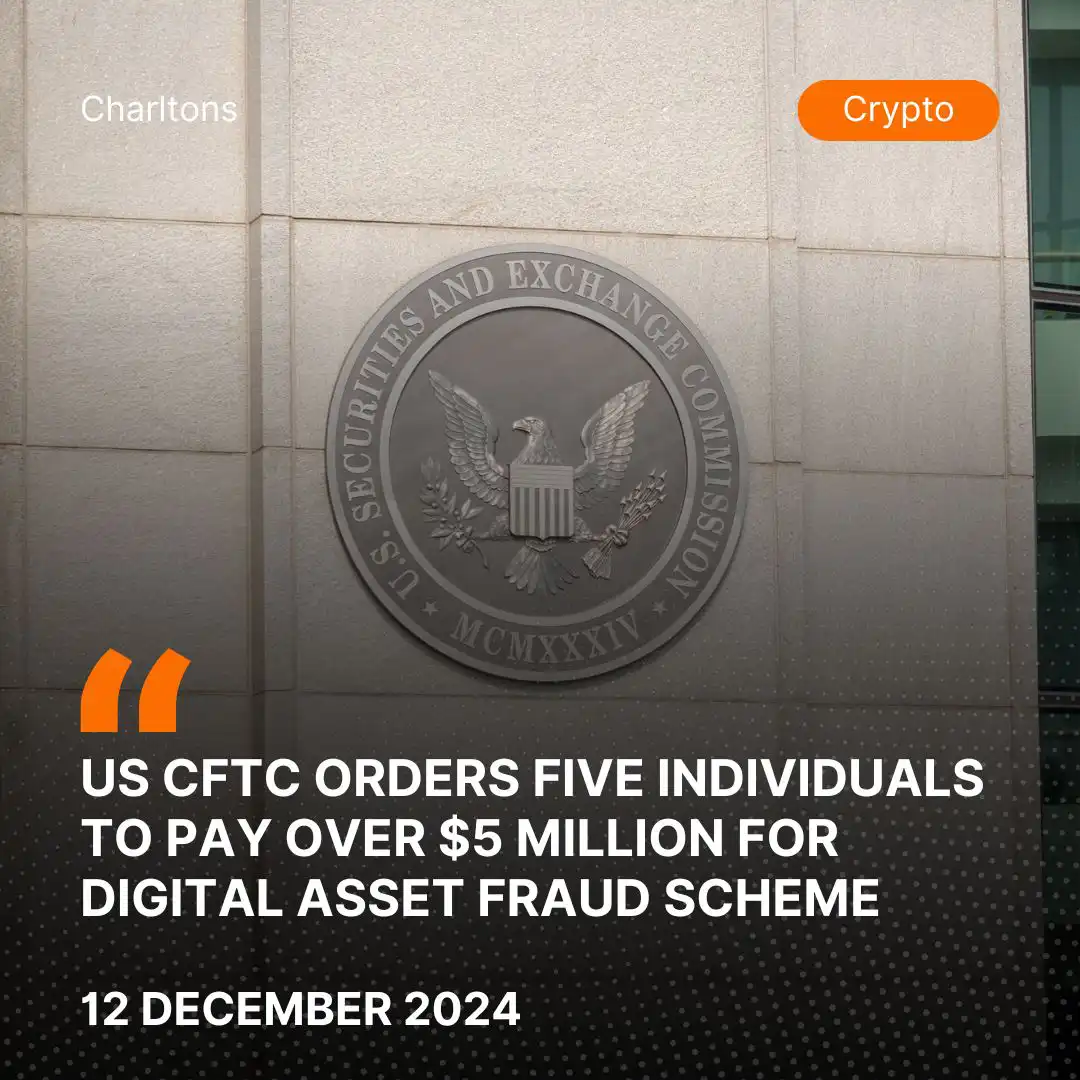
On 11 December 2024, the United States Commodity Futures Trading Commission (US CFTC) announced that the United States District Court for the Central District of California issued two orders against five individuals involved in a fraudulent digital asset scheme operating under the name Icomtech. The court’s consent order and default judgment require the defendants—Marco A. Ruiz Ochoa, David Carmona, Juan Arellano Parra, Moses Valdez, and David Brend—to collectively pay over $5 million for defrauding at least 190 investors out of more than $1 million through false promises of high returns from trading digital assets like Bitcoin.
The legal actions stem from the US CFTC’s May 2023 complaint, which charged the defendants with fraud and misappropriation in violation of the United States Commodity Exchange Act (CEA) and related US CFTC regulations. The court found that from August 2018 to December 2019, the defendants engaged in a deceptive scheme that falsely represented to investors that their funds would be used for trading digital asset commodities, offering daily returns between 0.9% and 2.8%, and promising to double investments within eight months. Instead, the defendants misappropriated the funds for personal use and to perpetuate the scheme, leaving many investors—predominantly from Spanish-speaking communities—with significant losses.
The court’s decision was grounded in specific provisions of the United States Commodity Exchange Act and US CFTC regulations, aiming to protect market participants from fraudulent practices. Section 6(c)(1) of the Commodity Exchange Act prohibits any manipulative or deceptive device or contrivance in connection with commodity transactions, including swaps and futures contracts. This provision serves as a fundamental anti-fraud measure within the Act. Similarly, CFTC Regulation 180.1(a) extends the prohibition to include the use or attempted use of fraudulent schemes, making untrue or misleading statements, and engaging in deceptive practices. Additionally, Section 13c(a) of the Commodity Exchange Act establishes liability for individuals who aid and abet violations, holding them accountable as principals in fraudulent activity.
In reaching its decision, the court meticulously examined evidence presented by the US CFTC and outlined several critical factors that demonstrated the defendants’ violations. The court found that the defendants knowingly made false statements to investors, claiming that their funds would be actively traded in digital asset markets to generate substantial returns. They also omitted critical information, such as the fact that the funds would be misappropriated for personal expenses and commissions, which a reasonable investor would consider significant when making investment decisions. Furthermore, the court determined that the defendants acted with scienter, intending to deceive and defraud their investors, and noted that their coordinated actions supported and facilitated the fraudulent activities of the others.
The orders issued by the court included significant monetary penalties and other relief to address the violations. The default judgment against Carmona, Arellano, Valdez, and Brend required each to pay a civil monetary penalty of $1 million. They were also held jointly and severally liable with Ruiz Ochoa for restitution totaling $1,098,920 to compensate the defrauded investors. The consent order against Ruiz Ochoa mandated similar restitution obligations and subjected him to a permanent injunction against future violations. All defendants are now permanently banned from registering with the US CFTC, trading in CFTC-regulated markets, and engaging in activities that violate the Commodity Exchange Act.
The court’s reasoning highlighted the severe impact on victims, many of whom lost their entire investments, and the defendants’ exploitation of vulnerable communities, particularly Spanish-speaking individuals. By imposing permanent trading and registration bans, the court aimed to protect the integrity of the markets and prevent the defendants from engaging in similar misconduct in the future.
The court’s civil orders align with parallel criminal actions pursued by the United States Attorney’s Office for the Southern District of New York. In related criminal proceedings, David Carmona pleaded guilty to wire fraud and was sentenced to 10 years in prison, with an order to forfeit over $329,450. Marco A. Ruiz Ochoa pleaded guilty to wire fraud, receiving a five-year prison sentence and forfeiture of $914,000. Restitution orders for both remain pending. Juan Arellano Parra pleaded guilty to wire fraud and conspiracy to commit money laundering, with sentencing pending, while David Brend was convicted of wire fraud at trial and sentenced to 10 years in prison and fined $40,000. The criminal charges against Moses Valdez remain unresolved.
This case underscores the US CFTC’s dedication to enforcing federal commodity laws and protecting investors from fraudulent schemes, especially in the rapidly evolving digital asset space. The court’s orders serve as a stern warning to those who seek to exploit investors through deceit and manipulation. By holding the defendants accountable through substantial financial penalties and permanent bans, the US CFTC and the judiciary aim to deter similar misconduct and uphold the integrity of the commodity markets.
Through collaborative efforts with federal prosecutors and other regulatory bodies, the US CFTC has demonstrated its commitment to combating financial fraud. Investors are urged to remain vigilant and report suspicious activities to help prevent such schemes from harming additional victims.
(Source: https://www.cftc.gov/PressRoom/PressReleases/9017-24, https://www.cftc.gov/media/11646/enfmarcoaruizochoaorder121024/download, https://www.cftc.gov/media/11651/enfdavidcarmonaorder102124/download)





